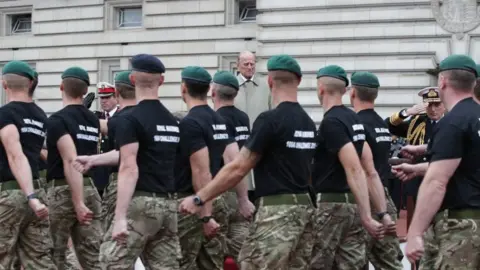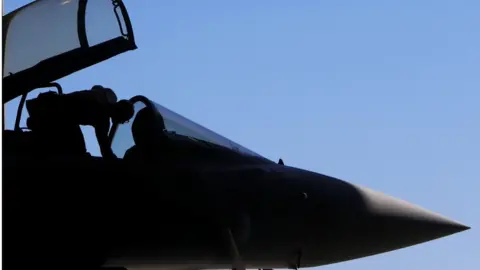UK military credibility 'at risk' over cuts
The former commander of the UK's Maritime Forces has said Britain is in danger of losing its status as a "credible military power".
Rear Admiral Alex Burton told the BBC that years of budget cuts and rising military threats meant the defence budget needed to be increased urgently.
He said the ability to "fight and win on the front line" was being affected.
And, if fresh spending wasn't announced, Britain would be morally poorer on the world stage.
His comments come 24 hours before the Chancellor's Spring Statement on the state of the public finances.
And the day after Philip Hammond said that there was "light" at the end of the austerity tunnel - possibly leaving some more headroom for spending increases.
Rear Admiral Burton, who left the armed forces last autumn, told me: "If you do not spend more on defence than we currently are as a percentage of GDP, then we put at risk the fact that we are currently a credible military power, and from that we put at risk our position on the global stage."
He said that military threats were increasing from countries like Russia, from cyber warfare and from terrorist organisations.
Rear Admiral Burton, who was also NATO commander in charge of "high readiness" naval forces, argued that with Britain preparing to leave the European Union it was vital that defence spending was raised to at least 2.5% of GDP to support global trade.
At present the government has a military spending target of 2% of GDP, set as the target for all members of NATO.
An increase to 2.5% would mean spending an extra £7.7bn a year on defence.
At present Russia spends more than 5% of its GDP on defence, and Britain now spends less on defence than under Tony Blair, when the figure was 2.7%.
"What worries me and worried me when I left the front line and was operating in headquarters is that some of the decisions we were making - and potentially over the next 12 months some of the decisions that will be made - will affect the ability to fight and win on the front line," he said, referring to the Modern Defence Programme Review which is looking at possible defence budget shortfalls over the next decade of £20bn.
"And the challenge is ensuring that we're still able to do that [fight and win] not just over the next 12 to 18 months, but that we're able to do that over the next 10 to 20 years."
 Getty Images
Getty ImagesThe Rear Admiral is still very well connected in military circles and his comments come two weeks after General Sir Gordon Messenger, Vice Chief of the Defence Staff, said that a case should be made for a "bigger defence budget".
Gavin Williamson, the defence secretary, is also believed to have clashed with Mr Hammond over defence spending.
The Spring Statement tomorrow is the second most important Parliamentary event on the economy after the Budget in the autumn.
Mr Hammond will lay out the latest information on the state of the economy and public spending.
Spending wisely
It is expected that the public finances will be in better shape than forecast last year, with borrowing about £10bn below the expected level.
That could give the Chancellor some increased headroom on spending though it has been made clear that the Spring Statement will not focus on new commitments.
Rear Admiral Burton said that he understood the needs of the NHS and the police, for example, had to be balanced by the government and that after the financial crisis the Ministry of Defence had to become more efficient and show it could spend money wisely - which it had done.
But he said military threats had to be taken seriously.
"Those threats are threats to our investments that we've got abroad," he said.
"So it would be easy for people to look at retired military people, of which I am one, and be critical - seeing us as defenders of totemic capabilities which have their lineage going back to the Second World War.
"Whether that's the Royal Marines, our amphibious capability, aircraft, tanks or regiments.
"But I believe that if we are to retain an edge for the military that we need, we need the sword upon which that edge can be had and that includes some of those capabilities that we've used since the Viking era and will continue to use many years ahead."
 Getty Images
Getty ImagesWithout stronger military capabilities, Britain would be less able to stand "toe-to-toe" alongside our trading allies.
"Without them [the military] we will be unable to deter, we'll be unable to reassure and deliver retribution," he said.
"And as a sovereign nation - an increasingly sovereign nation - I think that's critically important.
"Our insurance policy, I believe, will be compromised and our ability to stand up for our beliefs and protect our interests will be weakened.
Changing threats
"And I think that that will make the UK of the late 2010s and early 2020s poorer, both morally and financially."
Rear Admiral Burton said he understood the need for the military to show that it could spend money sensibly, and that it was now much more efficient than it had been in the past.
The Treasury said that defence spending was already growing to meet the "ever changing threats" and that it was the fastest growing budget in Whitehall.
"The UK maintains the biggest defence budget in Europe and the fifth largest in the world, already exceeding NATO's 2% spending target," a spokesperson said.
"Over the next three years, the defence budget is increasing by £1bn a year."
